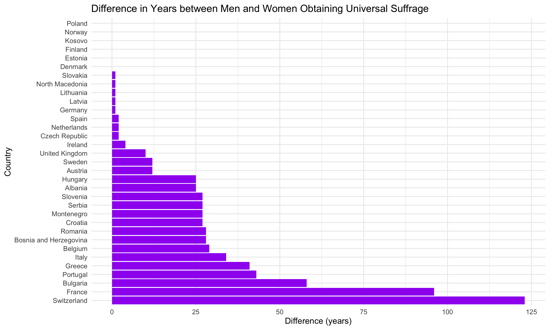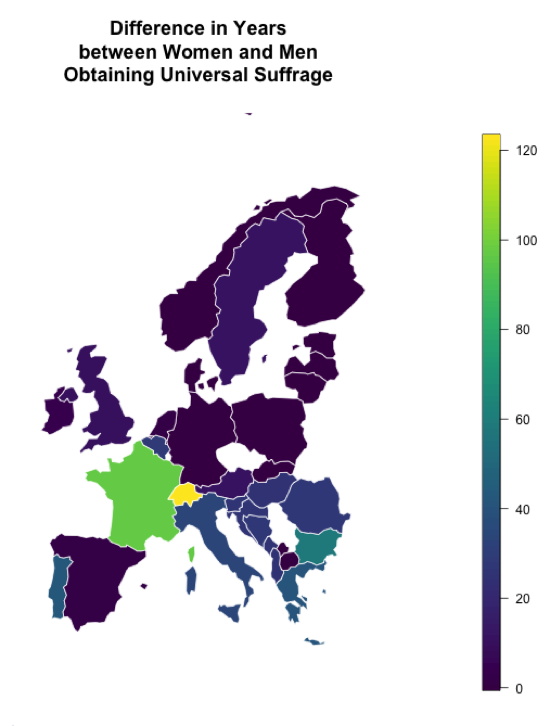Sensible and responsible women do not want to vote. The relative positions to be assumed by man and woman in the working out of our civilization were assigned long ago by a higher intelligence than ours.
Grover Cleveland, 1905
Ah, voting. Essential in a democracy and often the topic when it comes to injustices faced by women. And yeah, women took longer to get the vote. But how long? Usually you only see a map with the years women got the right to vote and that is pretty meaningless. You need to know the values for men as well and look at the difference. Even worse, it is easy to overestimate the difference, given that during most of history, nobody had the right to vote. (Let’s exclude ancient Greece, and even then there were lots of conditions to be eligible to vote.)
Looking online, it was rather hard to find the exact dates when all men vs. when all women were eligible to vote in modern times. You find tables easily for women, but not for men. Note that it is about all members of each group. I do not care that a select group of (usually) men can vote, that does not help those who cannot. It is when everyone (above a certain age) is able to vote.
To get the data, I asked ChatGPT 3.5 ( https://chat.openai.com ), and specified that I wanted the year every man vs. every women had universal suffrage.
Please generate a table showing the year all men vs. all women had the right to vote in European countries. First column is the country, second the year all men had the right to vote, third the year all women had the right to vote, and the fourth column the difference in years between women and men (women – men).
followed by
Please make the table a csv file and then an html table.
Which provided me with this table:
| Country | All Men’s Suffrage | All Women’s Suffrage | Difference (Women – Men) |
|---|---|---|---|
| United Kingdom | 1918 | 1928 | 10 |
| France | 1848 | 1944 | 96 |
| Germany | 1918 | 1919 | 1 |
| Sweden | 1909 | 1921 | 12 |
| Norway | 1913 | 1913 | 0 |
| Denmark | 1915 | 1915 | 0 |
| Finland | 1906 | 1906 | 0 |
| Netherlands | 1917 | 1919 | 2 |
| Belgium | 1919 | 1948 | 29 |
| Spain | 1931 | 1933 | 2 |
| Portugal | 1933 | 1976 | 43 |
| Italy | 1912 | 1946 | 34 |
| Greece | 1911 | 1952 | 41 |
| Austria | 1907 | 1919 | 12 |
| Switzerland | 1848 | 1971 | 123 |
| Ireland | 1918 | 1922 | 4 |
| Poland | 1918 | 1918 | 0 |
| Czech Republic | 1918 | 1920 | 2 |
| Slovakia | 1918 | 1919 | 1 |
| Hungary | 1920 | 1945 | 25 |
| Romania | 1918 | 1946 | 28 |
| Bulgaria | 1879 | 1937 | 58 |
| Croatia | 1918 | 1945 | 27 |
| Serbia | 1918 | 1945 | 27 |
| Bosnia and Herzegovina | 1918 | 1946 | 28 |
| Montenegro | 1918 | 1945 | 27 |
| Albania | 1920 | 1945 | 25 |
| North Macedonia | 1945 | 1946 | 1 |
| Slovenia | 1918 | 1945 | 27 |
| Kosovo | 1945 | 1945 | 0 |
| Latvia | 1918 | 1919 | 1 |
| Lithuania | 1918 | 1919 | 1 |
| Estonia | 1918 | 1918 | 0 |
I do not really trust ChatGPT here, and the years do vary if you state the query slightly different. But let’s assume for a moment that the values are correct. Sorted by difference there is quite a variance:

In some countries, men and women got the right to vote in the same year (or one year later), in others it took 10-20 years, and then there are those which took quite a bit longer. Not surprisingly, both France and Switzerland were the earliest countries in which any sex could vote at all, both in 1848. Even Bulgaria was in the 19th century (1879). If men got the right to vote in the 20th century, it took at most less than 50 years for women got get that right as well. In most cases much faster or at (almost) the same time.
Or shown on a map:

So, based on these numbers (and they might be wrong), I think most of the cries of injustice here are misleading. In most countries, differences are not that large.
There is also something I have heard a long time ago, something about the reason why in many countries men got the right to vote in 1918 was due to the first world war. Men were dying like flies, so they should be able to vote whether to go to war in the future. Seems like the idea was that that would prevent wars (well, that did not work out).
Even today, in many countries, it is only men who have to do mandatory military service, and IIRC there are countries in which you are only eligible to vote if you register for a possible draft.
Not that mandatory military or civilian service for a year to get voting rights is necessarily a bad thing. How was it …
Under our system every voter and officeholder is a man who has demonstrated through voluntary and difficult service that he places the welfare of the group ahead of personal advantage. And that is the one practical difference. He may fail is wisdom, he may lapse in civic virtue. But his average performance is enormously better than that of any other class of rulers in history.
«Starship Troopers» by Robert A. Heinlein
But if such a service is required, it should be required for both sexes.
Anyway, happy voting. 🙂